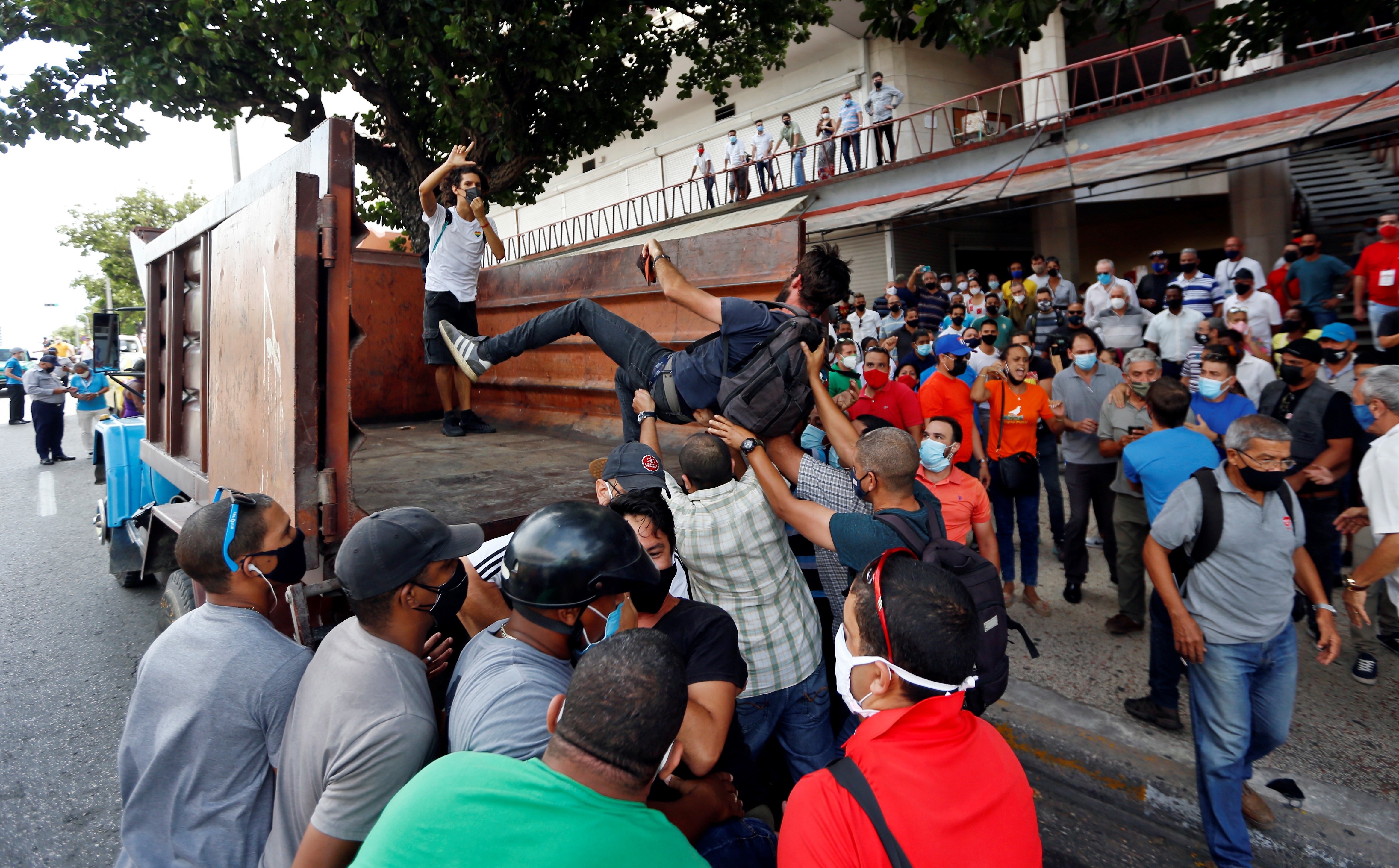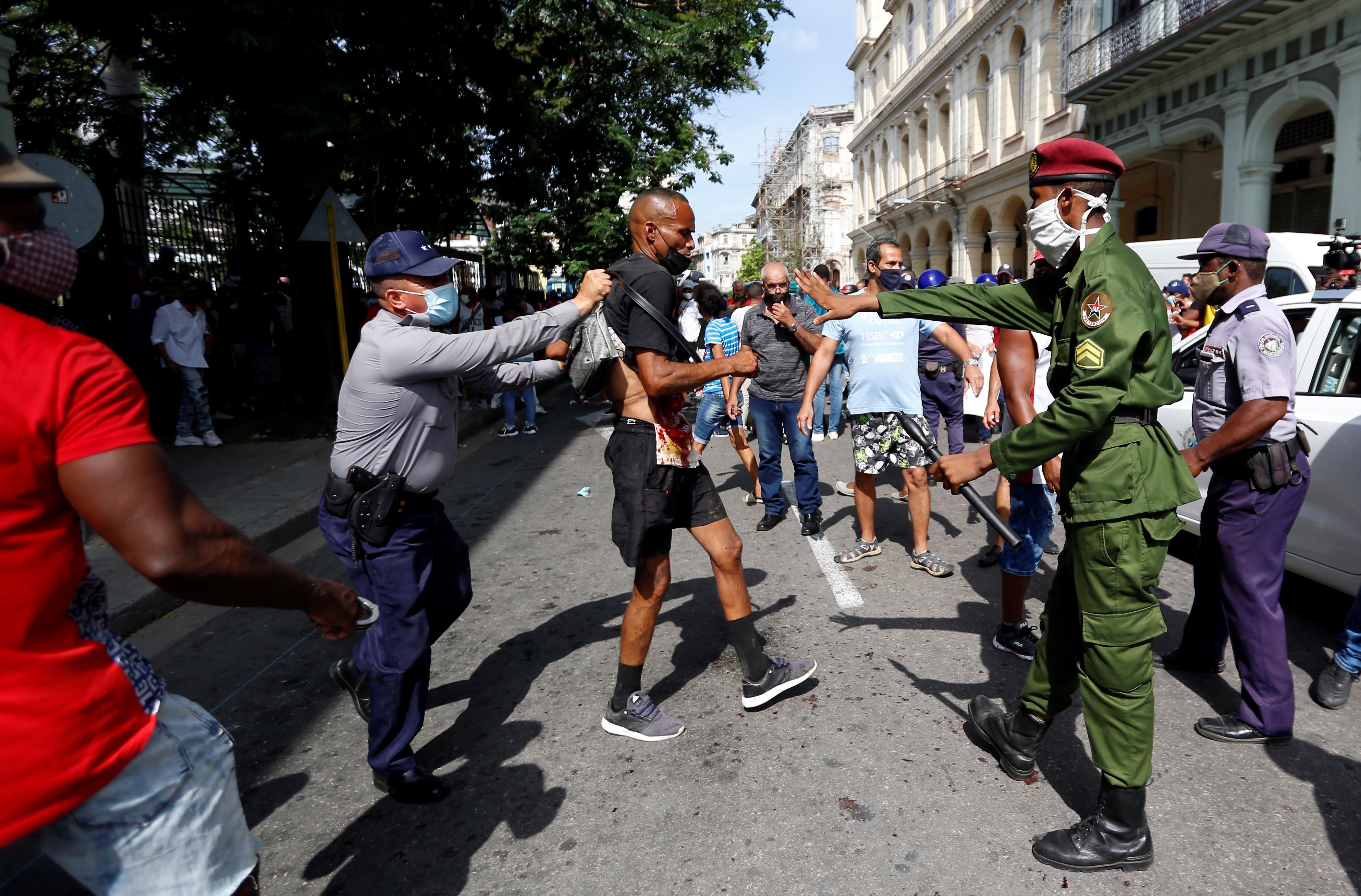
“The member organizations of the Coalition for Freedom of Association, the former rapporteurs and the former rapporteur for freedom of expression of the Inter-American Commission on Human Rights (IACHR), and the journalists who sign at the foot, urge the community to take concrete steps to call on the Cuban government to end the repression, arbitrary arrests and systematic persecutions of independent journalists, human rights activists, social media users and citizens in general who demand changes to existing regulations exercising their rights to freedom of expression, in addition to the rights of assembly, demonstration and association for lawful and peaceful purposes established in the Cuban Constitution adopted in 2019.”
This is how the Coalition's statement begins, which states: “At the same time, we urge the Cuban government to immediately and unconditionally release independent journalist Lazaro Yuri Valle Roca and youtuber and influencer Yoandi Montiel (known as “El Gato de Cuba”), who have been arbitrarily detained for the past several months charged with the crime of contempt for exercising their rights to freedom of expression”.
The Coalition for Freedom of Association is made up of 21 civil society organizations and was created in February 2021 with the purpose of “exercising democratic solidarity among civil society colleagues, calling in a coordinated manner for recognition of the right to freedom of association in countries where are severely restricted, uniting the voices of their members to amplify the scope of the order. The Coalition's work has initially focused on Latin America and the Caribbean,” the group stressed.
At the same time, he indicated that the Cuban State severely restricts the rights to freedom of expression, association, assembly, movement and due process.

“For decades, the Cuban State has organized the institutional machinery to silence voices outside the regime, to suppress independent journalists, as well as artists or citizens who seek to organize to articulate their demands; throughout that time the State has maintained a monopoly on social media,” according to notes the report on freedom of expression in Cuba published by the Office of the Special Rapporteur for Freedom of Expression of the Inter-American Commission on Human Rights in December 2018.
After the protests of July 11, 2021 in Cuba, in demand for better living conditions, to which thousands of people spontaneously added and generated international attention in an island-nation unaccustomed to public demonstrations against power, government repression against the opposition has intensified and intensified. “In fact, the authorities have increased restrictions based on new telecommunications regulations, in order to strengthen information censorship and expand official control,” he said.
The Colación recalled that, according to a statement from the Inter-American Commission on Human Rights, “as of February more than 700 people were still imprisoned in Cuba for their participation in the protests.”
The IACHR indicated that, according to official information dated January 24, the Attorney General's Office of the Republic of Cuba recorded a total of 790 people accused of “vandalism, which attacked authorities, persons and property, as well as serious disturbances of order.” In addition, penalties of up to 30 years of imprisonment would be imposed depending on the seriousness of the events, the statement said.
Last August, the Cuban regime ordered new measures that criminalize the act of sharing “false” and “offensive” information on the Internet, and extend the authorities' powers to restrict freedom of expression in cyberspace, as reported at the time by the Committee to Protect Journalists (CPJ, for its acronym in English).
According to the statement published in the official gazette of the Cuban Ministry of Justice, this is Decree-Law 35 “On Telecommunications, Information and Communication Technologies and the Use of Radio Spectrum”; resolutions 105, 107 and 108, on cybersecurity and the use of telecommunications networks; and Decree 42, on information and communication technologies.
The standards do not define the terms “false information” or others such as “collective security, general welfare and public morality” but clearly seek to strengthen government control over social media content. In a letter to the Cuban authorities, the rapporteurs for the promotion and protection of the right to freedom of opinion and expression (Irene Khan), on the rights to freedom of peaceful assembly and association (Clement Nyaletsossi Voule) and on the situation of human rights defenders (Mary Lawlor) analyzed Decree 35 and related norms and cautioned that the regulations “could be used to restrict freedom of expression in a manner inconsistent with the provisions of article 19 of the Universal Declaration of Human Rights, as well as freedom of peaceful assembly and association in accordance with the provisions of article 20 of the above-mentioned Statement”.

In Cuba, state-owned Internet service provider ETECSA has orders to block objectionable content, and prevents access to some blogs and news platforms critical of the regime, the group emphasized, adding: “Authorities charge critical journalists, peaceful activists and political dissidents through harassment, harassment, intimidation, physical and digital surveillance, arbitrary arrests, house searches and confiscations of equipment. On many occasions, journalists, activists and dissidents are forced into exile.”
He then indicated that, more recently, in January of this year, “the Supreme Court of Cuba presented a bill that will amend article 143 of the Penal Code and prohibit Cuban citizens from receiving foreign funds, a measure that would allow State authorities to muzzle the independent press that depends on it type of financing to carry out its activities, an initiative that stipulates sentences of up to 10 years' imprisonment”.
He added: “It is important to remember that the imprisonment of journalists in retaliation for their independent reporting work violates the most basic norms of international law, including Article 19 of the Universal Declaration of Human Rights, which guarantees every individual the right 'to investigate and receive information and opinions, and to disseminate them, without limitation of borders, by any means of expression '”.
The group also stated that, “at the same time, the Inter-American Commission on Human Rights and its special rapporteurs have emphasized that social protest is an essential mechanism to ensure respect and guarantee for economic, social, cultural and environmental rights, as noted in the report on Protest and Human Rights, urging the authorities to channel social discontent through dialogue and active listening to citizens' demands by taking whatever measures are necessary for their satisfaction”.
Finally, they said that “as civil society organizations that promote human rights and individuals committed to the defense of freedom of expression, we urge the international community to intercede with the Cuban government to demand an immediate end to repression against those who exercise peacefully their rights to freedom of expression, assembly, demonstration and association. We reiterate our call on the Cuban government to release Cuban citizens and Cuban citizens who are arbitrarily detained and we call for international solidarity with the victims of a State policy that represses and criminalizes any form of public dissent or criticism.”
Former rapporteurs/rapporteur for freedom of expression of the IACHR Santiago Cantón, Eduardo Bertoni, Ignacio Alvarez, Catalina Botero Marino and Edison Lanza signed the statement. And Latin American journalists Daniel Coronell (Colombia), Gustavo Gorriti (Peru), Raúl Peñaranda (Bolivia), Alejandra Matus (Chile), Janeth Hinostroza (Ecuador), José Rubén Zamora (Guatemala), Mauri König (Brazil), César Batiz (Venezuela), Octavio Enriquez (Nicaragua), Norma Morandini (Argentina), Javier Garza (Mexico) and Eduardo Ulibarri ( Costa Rica).
KEEP READING:
Últimas Noticias
Debanhi Escobar: they secured the motel where she was found lifeless in a cistern
Members of the Specialized Prosecutor's Office in Nuevo León secured the Nueva Castilla Motel as part of the investigations into the case

The oldest person in the world died at the age of 119
Kane Tanaka lived in Japan. She was born six months earlier than George Orwell, the same year that the Wright brothers first flew, and Marie Curie became the first woman to win a Nobel Prize

Macabre find in CDMX: they left a body bagged and tied in a taxi
The body was left in the back seats of the car. It was covered with black bags and tied with industrial tape
The eagles of America will face Manchester City in a duel of legends. Here are the details
The top Mexican football champion will play a match with Pep Guardiola's squad in the Lone Star Cup

Why is it good to bring dogs out to know the world when they are puppies
A so-called protection against the spread of diseases threatens the integral development of dogs




